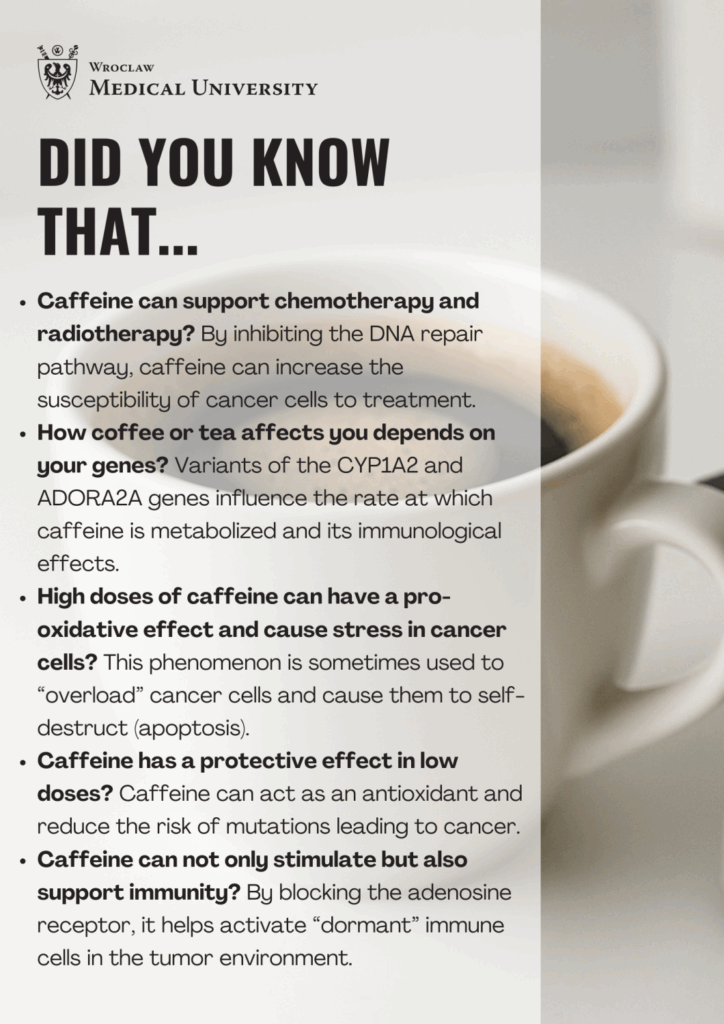Most of us treat it as a morning ritual or a way to get through a tough day. But can caffeine, the same substance that stimulates us after a cup of espresso, help in the fight against cancer? More and more studies suggest that this may be the case. A team of researchers from Wroclaw Medical University has presented a comprehensive review of evidence linking caffeine to anticancer effects.
Not just a stimulant
Caffeine is not just an energy boost; it is a biologically active compound that acts on nerve, muscle, immune, and cancer cells. In the body, it acts as a blocker of adenosine receptors, a substance that inhibits cell excitability and has anti-inflammatory properties. By blocking it, caffeine “unleashes” several processes, triggering, among other things, the release of adrenaline and cortisol, affecting immune function and metabolism. For years, it has been used to enhance the effects of painkillers such as paracetamol and aspirin, which is why the FDA has approved its combination with these drugs as an effective and safe treatment for acute headaches. At the same time, the authors emphasize that too much caffeine or its sudden withdrawal can… intensify headaches.
It turns out that caffeine can also disrupt the life cycle of cancer cells, block DNA repair mechanisms, and increase sensitivity to chemotherapy. It can also have a pro-oxidative effect, causing oxidative stress, which can be dangerous for healthy cells but can be deadly for cancer cells.
“Caffeine can enhance the effects of chemotherapy and radiotherapy because it inhibits a key DNA repair pathway, leading to the death of cancer cells,” says Dr. Nina Rembiałkowska from the Department of Molecular and Cellular Biology at Wroclaw Medical University. “It also acts as an antagonist of the adenosine A2A receptor, which means it can support the immune system in fighting cancer. In addition, caffeine has pro-oxidative properties in cancer cells, which increases their susceptibility to treatment.”
Caffeine as a therapy “enhancer”
As shown by the review studies conducted by the Wrocław team, caffeine can support the action of known anticancer drugs such as cisplatin, doxorubicin, and oxaliplatin. In combination with them, it increases the number of cancer cells that enter the path of irreversible damage and apoptosis, or programmed cell death. Interestingly, caffeine can also affect the immune system in the context of cancer. In the tumor environment, immune cells are often “put to sleep” by the adenosine molecule. By blocking its action, caffeine can restore the immune system’s ability to attack cancer cells. Studies in mice have shown that animals receiving caffeine were less likely to develop tumors and had a stronger immune response.
The dose makes the poison
Not everyone reacts to caffeine in the same way. How quickly we metabolize it and how intensely it affects our nervous or immune systems depends, among other things, on variants of the CYP1A2 and ADORA2A genes. People with so-called slow caffeine metabolism have it in their bloodstream for longer, which can enhance its effects, both beneficial and potentially harmful.
“Two things surprised me while working on the review,” admits Dr. Wojciech Szlasa. “First, the effects of caffeine can vary greatly depending on the dose: low doses have a protective, antioxidant effect, while high doses are harmful to cancer cells and have a pro-oxidant effect. Second, the patient’s genetics can significantly affect the effectiveness and safety of caffeine. In some people, it may be more effective against cancer than in others.”
It is therefore essential to remember that caffeine is not a miracle drug and its effects depend on the context. In small doses, it can have a protective effect as an antioxidant. In large doses, on the contrary, it can increase oxidative stress and cause side effects such as insomnia, hypertension, and heart rhythm disorders.
“The doses of caffeine effective in in vitro studies (100-500 µM) are significantly higher than those achieved after drinking coffee (approximately 10 µM after 200 mg of caffeine),” explains Dr. Rembiałkowska. “This means that the biologically active concentrations used in the studies exceed what can be safely achieved by drinking coffee. Therefore, further research is needed on the safe increase of doses in clinical settings.”
The publication by the Wroclaw team does not proclaim caffeine to be a cure for cancer. However, it does point to its potential as a natural compound that supports treatment. If future studies confirm these observations, it may turn out that what we drink out of habit today will become part of therapy tomorrow, although probably not in the form of a pumpkin latte, but rather a precisely dosed preparation.

This material is based on an article:
Caffeine as a modulator in oncology: mechanisms of action and potential for adjuvant therapy
Authors: Nina Rembiałkowska, Alina Demiy, Alicja Dąbrowska, Jakub Mastalerz, Wojciech Szlasa
DOI: 10.3390/ijms26136252
______________________________________________________________________________